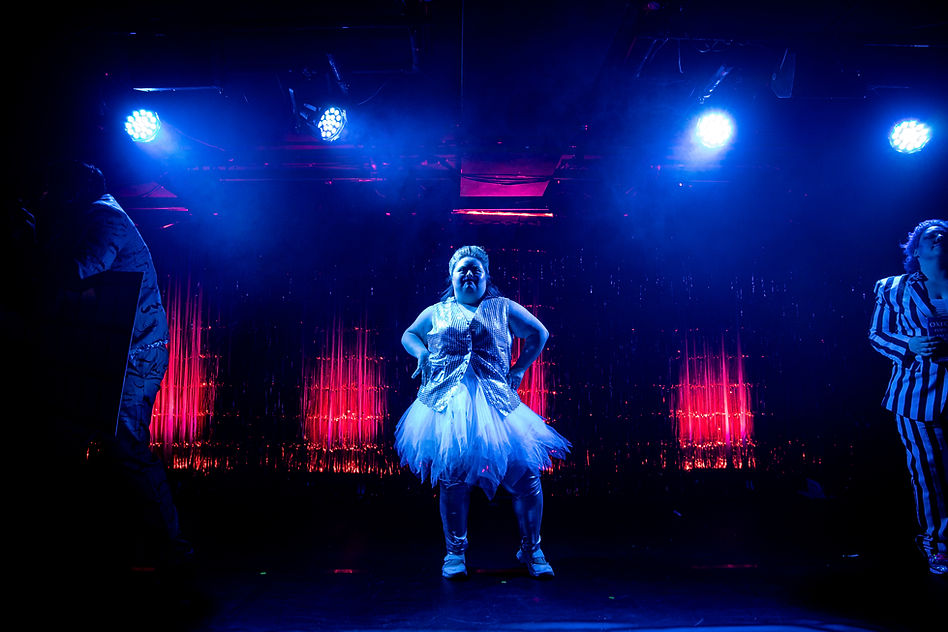

Award- winning Crip Queer Punk Cabaret-Theatre Not Your Circus Dog Collective!






Interview with Rayanne Kelly for University of East London
Can you tell me about your current Practice as Performance Research project?
My performance-research addresses the ongoing systemic discrimination and exclusion of learning disabled and autistic people from the performing arts, and secondly it addresses wider discourse on self-representation, inclusion and self-advocacy for people with learning disabilities.
I aim to create an innovative Crip-theatre-aesthetic that has radical impact upon audience’s ‘waking-up-into-action’, and realization of their own implication of learning disability-discrimination. The impact of this work reaches beyond the performing arts, and internationally in arguing for self-representation and self-advocacy for learning disabled disabled and neuro-divergent people. I’m one of the co-founders & artistic director of NoT YoUr CiRcUs DoG CoLlEcTiVe. We are a company of neuro-divergent and learning disabled artists making radical and subversive performance. Our theatre-cabaret, Not F**kin’ Sorry! (Produced by Daisy Hale in partnership with Access All Areas. (http://www.accessallareastheatre.org/notfckinsorry). We had had successful run at Soho Theatre, London in November 2019, with standing ovations and some super reviews .
I've written/co-written with one of the performers, Emma Selwyn, quite extensively about restaging learning disability in the Performing Arts through publications plus presenting at a number of conferences and events (including Inclusion International in Israel, 2019 and Live Arts Development Agency, 2018, for Queen Fun (Duckie) and NYU 2020).
I’m really committed to challenging the power dynamics that often perpetuate during a devising and rehearsal process when working with learning disabled and fellow neuro-divergent artists. I am influenced by Barne’s Emancipatory Disability Research Frame, as well as Kafers’s Relational-Political Model of Disability that drives my practice and teaching. (2013)
I think that it is utterly vital that as a practitioner often working with people who experience everyday discrimination, marginalisation, exclusion, hate crime, constantly having to justify their human rights, being infantilised , denied sexualities, being parents, relationships, and even higher education is often still denied – that I commit to breaking down those ableist structures and systems that still are driven and embedded in our society.
I also create solo feminist performance art as Doris La Trine, most known for Flushed, and Wickedly Wild Cabaret that I curated and hosted for Women of the World, Southbank Centre. Doris performs with a very large golden toilet, personified as ‘Len’. Written about by Gemma Commane in 2020:
“The performance (Flushed) re-appropriates burlesque and uses the reveal as a political weapon to give visibility to stories of femininity, but also as a feminist praxis to confront the commodification of women’s experience into a neat, clean and safe narrative. Dirtiness, the abject and feelings of unease are areas which Doris La Trine plays with, specifically turning the body into a site of protest. This site of protest confronts audiences with an inescapable truth about women’s experiences. “ p.27 Commane 2020 Commane, G. (2020) Bad Girls, Dirty Bodies: Sex, Performance and Safe Femininity, Bloomsbury Academic
I re-perform, re-frame, re-represent and make parody of the domestic , the family and this piece is about Bulimia. Doris & Len have performed at Café De Paris, Duckies, Glastonbury, Royal Court Theatre, Southbank Centre, Lost Vaguenes and conferences. In 2018 I was commissioned to co-curate and performed https://royalcourttheatre.com/whats-on/takeupspacecabaret/. Following a successful Women of the World (WoW) Cabaret at the Southbank Centre that I curated and hosted, (Wickedly Wild Women: https://burdy.co/featured-act/doris-la-trine/ ), whereby I programmed a diverse number of artists including the late Katharine Araniello.
Would you mind explaining what neuro divergent is?
I’ll try, a colleague of mine who has dyspraxia uses the term transgressive rather than neuro divergent, however let’s start with ‘Neuro-Diversity’: Neurodiversity is an approach to learning and disability that argues diverse neurological conditions are result of normal variations in the human genome. This portmanteau of neurological and diversity originated in the late 1990s as a challenge to prevailing views of neurological diversity as inherently pathological, instead asserting that neurological differences should be recognized and respected as a social category on a par with gender, ethnicity, sexual orientation, or disability status.
A neurodivergent person is defined as one whose neurological development and state are atypical, usually viewed as abnormal or extreme. The term was coined in the neurodiversity movement as an opposite for "neurotypical" .Several recognised types of neurodivergence, include autism, Asperger's syndrome, dyslexia, dyscalculia, epilepsy, hyperlexia, dyspraxia, ADHD, obsessive-compulsive disorder (OCD), and Tourette syndrome. https://www.disabled-world.com/disability/awareness/neurodiversity/
So how did you get to where you are now?
I began my professional career as a drama teacher in secondary schools and at the same time co-formed Unmask Theatre Company with Vishni Velada Billson (now Head of Participation at Royal Court Theatre). Together we created Theatre-In-Education (TiE) projects and training for schools as well as freelancing as a drama facilitator for adult drama groups and a devising-director for a number of young people. I gained a position as Drama Specialist and Teacher at a wonderful SEN school in Tower Hamlets (Bromley Hall School) working and learning with children and young people with physical and learning disabilities. It was at Bromley Hall that I started to understand access. I then landed a position at the Half Moon Young People’s Theatre in East London, Tower Hamlets, where I developed schools projects, and led the performance and disability strand through CinN funding that led to an arts council symposium called Off The Page that called for children and young people’s youth theatre to be more accessible. We had Forced Entertainment, Graeae, Darryl Beaton, Ewan Marshall as some of our presenters – an amazing and memorable event. Whilst at Half Moon, I embarked upon an MA at Goldsmiths in Directing Theatre – and where I started to bring together and to articulate more my dissatisfaction and uncomfortableness with the performing arts industries lack of access into the arts for disabled people. https://www.stagesofhalfmoon.org.uk/personnel/liselle-terret/
I then took up a temporary position at the Unicorn Theatre for Children, during which I collaborated with Graeae Theatre Company, and was privileged to work and learnt with the important Cecily O’Neill, and at the same time was introduced to The Laundretta’s,formed by Kay Dunnings (AD of Shangrila) a collective of multi-disciplinary women artists making site specific comedic performance art and happenings (incl. Lost Vagueness & Glastonbury). https://www.theguardian.com/music/2017/jun/22/lost-vagueness-film-glastonbury-festival We built 1950s, 60s, 70s, 80s and futuristic environments festivals, and we all lived and embodied characters that the public would interact with. For example, I started to develop my alter-ego, Doris La Trine through these happenings. We toured nationally.
In 2002 I became a lecturer in Applied Theatre at Royal Central School of Speech and Drama where I worked for 10 years. While at Central, Nick Llewellyn (AD of Access All Areas) and I co-formed the Diploma in Performance-Making for Learning Disabled and Autistic Adults, then funded by the Leverhulme Trust – now Sky Arts. Here are two interviews about the course Mackey, S & Terret, L (2015)
https://www.tandfonline.com/doi/abs/10.1080/13569783.2015.1070663
http://diversefutures.org.uk/pioneers-liselle-terret.html
As well as co-writing the diploma, teaching and directing on it, I also led an Emancipatory Research Project in collaboration with a number of the students on the course, as well as observing and writing about both Matt Fraser and the late Katharine Araniello’s utterly brilliant workshops on parodying disability – that led to publication – click on link):
https://repository.uel.ac.uk/researcher/803x0/ms-liselle-terret
